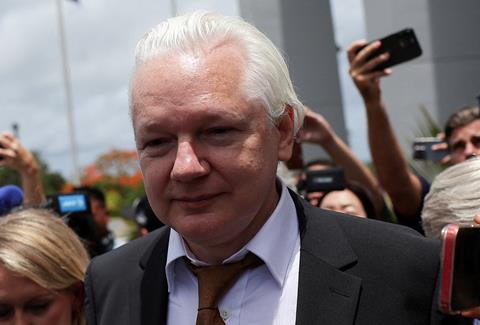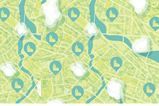Simply publishing information that others would prefer to remain hidden is not journalism, says Tim Wyatt. Here’s why he is struggling with those who wish to laud the WikiLeaks founder as some kind of hero of free speech

Julian Assange is now a free man, safely back on his home soil of Australia. The hacker, whistleblower and activist came to a surprise deal with the American authorities, pleading guilty to one charge of violating the Espionage Act. In return, his time served in a British jail since 2019 was taken as sufficient punishment, and he was set free.
On a human level, it’s hard not to be pleased that this saga has finally come to an end. Assange has unquestionably suffered a lot since he first published classified US military files from the Iraq and Afghan wars and, later, a huge trove of diplomatic messages.
He spent seven years inside the Ecuadorian embassy and a further five in prison fighting efforts to extradite him to the US. But as a journalist and a Christian, I struggle to get on board with those who lionise him as a hero and have castigated the US and UK authorities for pursuing him.
What is a journalist?
Contrary to what Assange and his supporters believe, simply publishing information that someone else wants to remain hidden does not make you a journalist, nor is it intrinsically virtuous.
Dumping reams of classified documents on the internet is not journalism and neither is it responsible. Journalists, especially those working in the arena of national security, hold immense power. What they reveal to the world can literally have life and death consequences.
I struggle to get on board with those who lionise him as a hero
Therefore, journalists do not simply publish every scrap of information they gather. They sift through things carefully, considering if publication is in the public interest. They weigh up competing priorities, and the risks and benefits of something secret becoming known. They work hard to check their facts from multiple sources. They exercise their power responsibly.
Balancing risk
Assange did none of this. When he was given large amounts of classified files, he simply stuck them online in a huge searchable database. In WikiLeaks: Inside Julian Assange’s war on secrecy (Guardian Books), David Leigh and Luke Harding describe how the journalists Assange was working with pleaded with him to redact names and identifying details from the documents, to avoid putting real people at risk of murder in Afghanistan and Iraq for collaborating with the US authorities.
Assange’s immediate response was chilling: “Well, they’re informants,” Assange replied. “So, if they get killed, they’ve got it coming to them. They deserve it.” The diplomatic cables he put online - without any editing or redactions - also exposed a number of journalists, religious leaders, human rights advocates and political dissidents living under dangerous dictatorships around the world.
Another tenet of journalism is impartiality. But Assange and WikiLeaks are anything but. As his blithe hostility to Afghans and Iraqis who worked with the US reveals, his political hostility to America blinds his judgement and makes him content to ally with some of the world’s worst regimes simply because they are anti-American.
Most notably, WikiLeaks published thousands of emails hacked from Hilary Clinton’s campaign in the weeks before the 2016 US election. A report by the US Senate committee later concluded that WikiLeaks played a “key role” in Russia’s effort to assist Republican Trump’s campaign and “likely knew” it was helping Russian intelligence agencies as part of Moscow’s effort to interfere with the election and destabilise its enemy.
Character matters
Christian journalists should not see Assange as a hero or an ally. And all Christians should be appalled at his moral character.
His flight into Ecuador’s London embassy in 2012 was not primarily about avoiding extradition to the US to face (as yet unfiled) charges related to his WikiLeaks activities. Rather, he was fleeing extradition to Sweden, where he was wanted on charges of rape and sexual assault.
Assange has always denied the charges, but rather than prove his innocence in court, he hid in the embassy for years, dragging out proceedings for so long that the Swedish authorities, despite maintaining their confidence in the account of the alleged victims, dropped the charges.
Shining a light
I hold no candle for Assange. But all that said, Christians should believe in whistleblowing. The Bible teaches that sin mars everyone. No government will always act with integrity. Therefore, it is important that people concerned by their government’s actions can (and do) leak information the state would rather keep secret.
Journalism which upholds democracy and fights for justice is only possible if reporters are able to pry into dark corners. Stories which have previously helped end injustice have only been possible because brave individuals broke the rules and leaked evidence to fair-minded journalists willing to publish it.
So there is a tension and a balance here. Governments legitimately need to keep some things secret in the interests of national security. But these laws should not be draconianly enforced against journalists serving the public interest.
Dumping reams of classified documents on the internet is not journalism
For all his flaws, Assange did help publish some things – most notably a shocking video of American soldiers gunning down Iraqi civilians and two journalists – which needed to be made known and helped hold power to account.
Many journalists who do not worship at the altar of Assange have still noted the potential chilling effect of the US authorities’ long pursuit of the WikiLeaks founder.
James Clapper, a former director of national intelligence for the US, summed up the dilemma after the news of Assange’s deal broke: “There is somewhat of a religious argument here between those who are proponents of transparency and those who are concerned about security,” he told the BBC. “This is an endless argument.”
Where to draw the line is never easy or obvious. But good, just and God-honouring governments should welcome the scrutiny that fair yet robust journalism offers on behalf of the public it serves.






































3 Readers' comments